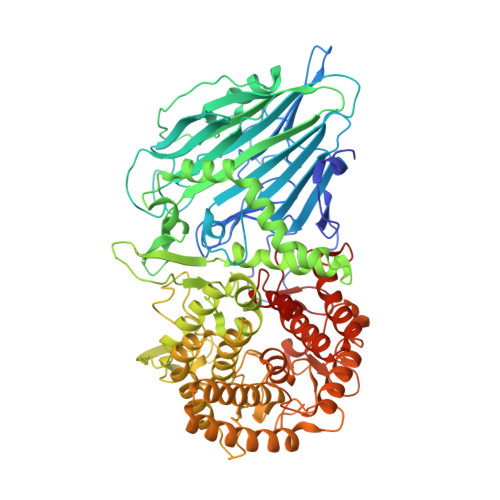Reaction Mechanism of Glycoside Hydrolase Family 116 Utilizes Perpendicular Protonation.
Pengthaisong, S., Piniello, B., Davies, G.J., Rovira, C., Ketudat Cairns, J.R.(2023) ACS Catal 13: 5850-5863
- PubMed: 37180965
- DOI: https://doi.org/10.1021/acscatal.3c00620
- Primary Citation of Related Structures:
8I5O, 8I5P, 8I5Q, 8I5R, 8I5S, 8I5T, 8I5U - PubMed Abstract:
Retaining glycoside hydrolases use acid/base catalysis with an enzymatic acid/base protonating the glycosidic bond oxygen to facilitate leaving-group departure alongside attack by a catalytic nucleophile to form a covalent intermediate. Generally, this acid/base protonates the oxygen laterally with respect to the sugar ring, which places the catalytic acid/base and nucleophile carboxylates within about 4.5-6.5 Å of each other. However, in glycoside hydrolase (GH) family 116, including disease-related human acid β-glucosidase 2 (GBA2), the distance between the catalytic acid/base and the nucleophile is around 8 Å (PDB: 5BVU) and the catalytic acid/base appears to be above the plane of the pyranose ring, rather than being lateral to that plane, which could have catalytic consequences. However, no structure of an enzyme-substrate complex is available for this GH family. Here, we report the structures of Thermoanaerobacterium xylanolyticum β-glucosidase ( Tx GH116) D593N acid/base mutant in complexes with cellobiose and laminaribiose and its catalytic mechanism. We confirm that the amide hydrogen bonding to the glycosidic oxygen is in a perpendicular rather than lateral orientation. Quantum mechanics/molecular mechanics (QM/MM) simulations of the glycosylation half-reaction in wild-type Tx GH116 indicate that the substrate binds with the nonreducing glucose residue in an unusual relaxed 4 C 1 chair at the -1 subsite. Nevertheless, the reaction can still proceed through a 4 H 3 half-chair transition state, as in classical retaining β-glucosidases, as the catalytic acid D593 protonates the perpendicular electron pair. The glucose C6OH is locked in a gauche , trans orientation with respect to the C5-O5 and C4-C5 bonds to facilitate perpendicular protonation. These data imply a unique protonation trajectory in Clan-O glycoside hydrolases, which has strong implications for the design of inhibitors specific to either lateral protonators, such as human GBA1, or perpendicular protonators, such as human GBA2.
- School of Chemistry, Institute of Science, Suranaree University of Technology, Nakhon Ratchasima 30000, Thailand.
Organizational Affiliation:





















